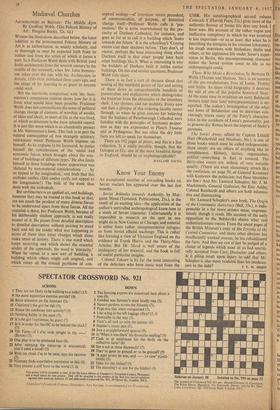Know Your Enemy
AN exceptional number of rewarding books on Soviet matters has appeared over the last few months.
Soviet Attitudes towards Authority, by Mar- garet Mead (Tavistock Publications, 21s.), is the result of an exciting idea—the application of the author's unrivalled anthropological know-how to a study of Soviet character. Unfortunately it is impossible to research on the spot as one might do in New Guinea or Chicago, and material is either from rather unrepresentative refugees or from Soviet official teachings. This is rather like forming a view of Victorian England on the evidence of Frank Harris and the Thirty-Nine Articles. But Dr. Mead is well aware of the inadequacy of her material, and the book is full of useful particular insights.
Colonel Tokaev is by far the most interesting of the defectors who have come west from the
USSR. His autobiographical second volume Comrade X (Harvill Press, 21s.) gives more of the authentic flavour of Soviet life than any book I have seen. His account of the rather vague and ineffective conspiracy in which he was involved is less important—to us at least. But when he is describing the intrigues in his aviation laboratory, his tough interviews with Malenkov, Stalin and others, or his nightmare life under Serov's super- vision in Berlin, this uncompromising character makes the Soviet system come to life as no anthropologist could.
Three Who Made a Revolution, by Bertram D. Wolfe (Thames and Hudson, 30s.), is an account of the pre-revolutionary lives of Lenin, Trotsky and Stalin. As sheer vivid biography it deserves the sale of one of the popular historical 'lives.' At the same time its erudition on early Bolshevik matters (and their later misrepresentation) is un- equalled. The author's investigation of the whys and hows of Bolshevism and its doctrines con- vincingly traces many of the Party's character- istics to the accidents of Lenin's personality, just as present-day Russia bears the imprint of Stalin's paranoia.
The Soviet Army, edited by Captain Liddell Hart (Weidenfeld and Nicolson, 36s.), is one of those books which must be called indispensable; there simply are no others of anything like its completeness. History, tactics, organisation, politics—everything in fact is covered. The thirty-nine essays are, indeed, of very variable quality. (There are even elementary errors like the confusion, on page 50, of General Kamenev with Kamenev the politician; but these blemishes are few.) And Mr. Leonard Schapiro, Mr. J. M. Mackintosh, General Guderian, 'Sir Eric Ashby, Colonel Reinhardt and others arc both informa- tive and illuminating.
Mr. Leonard Schapiro's own book, The Origin of the Communist Autocracy (Bell, 35s.), is indis- pensable in a far more serious sense unpreten- tiously though it reads. His account of the early opposition to the Bolsheviks .shows what real authoritativeness means. From the uncut pages of the British Museum's copy of the Izvestia of the Central Committee, and many other obvious but insufficiently worked sources, he has rehabilitated the facts. And thus we can at last be purged of a clutter of legends which most of us had uncriti- cally accepted from Carr, Deutscher and others. Is it piling insult upon injury to add that Mr. Schapiro is also more readable than his predeces-
sors in the field? I. E. M ARDEN














































 Previous page
Previous page